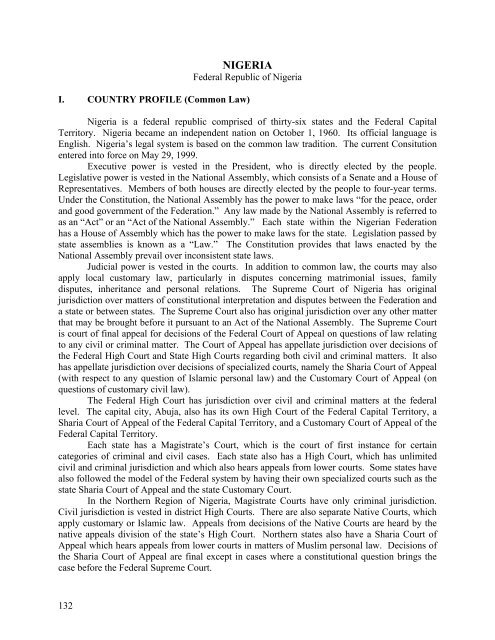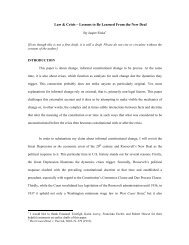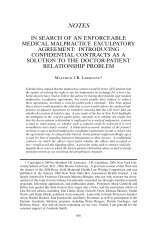Guide to Foreign and International Legal Citations - New York ...
Guide to Foreign and International Legal Citations - New York ...
Guide to Foreign and International Legal Citations - New York ...
Create successful ePaper yourself
Turn your PDF publications into a flip-book with our unique Google optimized e-Paper software.
132<br />
NIGERIA<br />
Federal Republic of Nigeria<br />
I. COUNTRY PROFILE (Common Law)<br />
Nigeria is a federal republic comprised of thirty-six states <strong>and</strong> the Federal Capital<br />
Terri<strong>to</strong>ry. Nigeria became an independent nation on Oc<strong>to</strong>ber 1, 1960. Its official language is<br />
English. Nigeria’s legal system is based on the common law tradition. The current Consitution<br />
entered in<strong>to</strong> force on May 29, 1999.<br />
Executive power is vested in the President, who is directly elected by the people.<br />
Legislative power is vested in the National Assembly, which consists of a Senate <strong>and</strong> a House of<br />
Representatives. Members of both houses are directly elected by the people <strong>to</strong> four-year terms.<br />
Under the Constitution, the National Assembly has the power <strong>to</strong> make laws “for the peace, order<br />
<strong>and</strong> good government of the Federation.” Any law made by the National Assembly is referred <strong>to</strong><br />
as an “Act” or an “Act of the National Assembly.” Each state within the Nigerian Federation<br />
has a House of Assembly which has the power <strong>to</strong> make laws for the state. Legislation passed by<br />
state assemblies is known as a “Law.” The Constitution provides that laws enacted by the<br />
National Assembly prevail over inconsistent state laws.<br />
Judicial power is vested in the courts. In addition <strong>to</strong> common law, the courts may also<br />
apply local cus<strong>to</strong>mary law, particularly in disputes concerning matrimonial issues, family<br />
disputes, inheritance <strong>and</strong> personal relations. The Supreme Court of Nigeria has original<br />
jurisdiction over matters of constitutional interpretation <strong>and</strong> disputes between the Federation <strong>and</strong><br />
a state or between states. The Supreme Court also has original jurisdiction over any other matter<br />
that may be brought before it pursuant <strong>to</strong> an Act of the National Assembly. The Supreme Court<br />
is court of final appeal for decisions of the Federal Court of Appeal on questions of law relating<br />
<strong>to</strong> any civil or criminal matter. The Court of Appeal has appellate jurisdiction over decisions of<br />
the Federal High Court <strong>and</strong> State High Courts regarding both civil <strong>and</strong> criminal matters. It also<br />
has appellate jurisdiction over decisions of specialized courts, namely the Sharia Court of Appeal<br />
(with respect <strong>to</strong> any question of Islamic personal law) <strong>and</strong> the Cus<strong>to</strong>mary Court of Appeal (on<br />
questions of cus<strong>to</strong>mary civil law).<br />
The Federal High Court has jurisdiction over civil <strong>and</strong> criminal matters at the federal<br />
level. The capital city, Abuja, also has its own High Court of the Federal Capital Terri<strong>to</strong>ry, a<br />
Sharia Court of Appeal of the Federal Capital Terri<strong>to</strong>ry, <strong>and</strong> a Cus<strong>to</strong>mary Court of Appeal of the<br />
Federal Capital Terri<strong>to</strong>ry.<br />
Each state has a Magistrate’s Court, which is the court of first instance for certain<br />
categories of criminal <strong>and</strong> civil cases. Each state also has a High Court, which has unlimited<br />
civil <strong>and</strong> criminal jurisdiction <strong>and</strong> which also hears appeals from lower courts. Some states have<br />
also followed the model of the Federal system by having their own specialized courts such as the<br />
state Sharia Court of Appeal <strong>and</strong> the state Cus<strong>to</strong>mary Court.<br />
In the Northern Region of Nigeria, Magistrate Courts have only criminal jurisdiction.<br />
Civil jurisdiction is vested in district High Courts. There are also separate Native Courts, which<br />
apply cus<strong>to</strong>mary or Islamic law. Appeals from decisions of the Native Courts are heard by the<br />
native appeals division of the state’s High Court. Northern states also have a Sharia Court of<br />
Appeal which hears appeals from lower courts in matters of Muslim personal law. Decisions of<br />
the Sharia Court of Appeal are final except in cases where a constitutional question brings the<br />
case before the Federal Supreme Court.
















